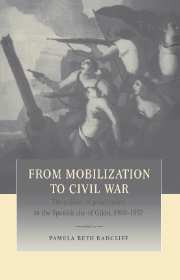Book contents
- Frontmatter
- Contents
- List of maps
- List of tables
- Acknowledgments
- Glossary of terms and abbreviations
- Introduction
- 1 A turning point: the city in 1900
- PART I Patterns of life in working-class Gijón
- PART II Institutional forces of opposition: republicans and anarchosyndicalists
- PART III Defining an oppositional culture: the struggle over the public sphere
- 7 Republican culture: a nation of citizens
- 8 Labor movement culture: the brotherhood of workers
- PART IV The urban battlefield: conflict and collective action, 1901–1936
- Conclusion
- Appendix 1 Wage and price movement
- Appendix 2 Occupations by status category
- Appendix 3 Supplementary tables
- Select bibliography
- Index
7 - Republican culture: a nation of citizens
Published online by Cambridge University Press: 31 October 2009
- Frontmatter
- Contents
- List of maps
- List of tables
- Acknowledgments
- Glossary of terms and abbreviations
- Introduction
- 1 A turning point: the city in 1900
- PART I Patterns of life in working-class Gijón
- PART II Institutional forces of opposition: republicans and anarchosyndicalists
- PART III Defining an oppositional culture: the struggle over the public sphere
- 7 Republican culture: a nation of citizens
- 8 Labor movement culture: the brotherhood of workers
- PART IV The urban battlefield: conflict and collective action, 1901–1936
- Conclusion
- Appendix 1 Wage and price movement
- Appendix 2 Occupations by status category
- Appendix 3 Supplementary tables
- Select bibliography
- Index
Summary
The outlines of republican culture, which drew its inspiration from the eighteenth- and nineteenth-century liberal revolutions, were clearly demarcated by the onset of the twentieth century, and changed little before the Civil War. This culture was dedicated, at least in theory, to the democratic participation of an educated public, to the secularization of society, and, in a more general way, to the modernization of a “backward” country. Republicans were not the exclusive guardians of this broad democratic agenda, but they were its main proponents, especially in Gijón. Moreover, they saw themselves as its primary agents, the leaders who would mold the ignorant pueblo into the rational citizenry of the future. When the future became the present, in 1931, the republicans had to continue the process of transforming the public sphere while simultaneously creating and implementing new political institutions. The success of the Republic depended on both foundations: on sound institutions and on a republican public that understood and accepted them.
In Gijón, the bulk of a republican public had to be culled from the large working-class population, which was uneducated but ripe for change. As argued in Chapter 1, republican groups and individuals began this task in the late nineteenth century, with institutions like the Ateneo and the University Extension, but it intensified in the twentieth century as republicanism enhanced its local political power and the competing labor movement strengthened its challenge. The Ateneo continued to be the model for organizations designed to civilize and educate the lower classes, and it even enhanced its impact with the creation of several branches, located primarily in the working-class barrios.
- Type
- Chapter
- Information
- From Mobilization to Civil WarThe Politics of Polarization in the Spanish City of Gijón, 1900–1937, pp. 199 - 225Publisher: Cambridge University PressPrint publication year: 1997



